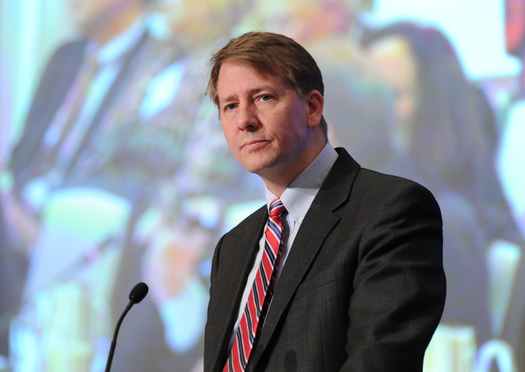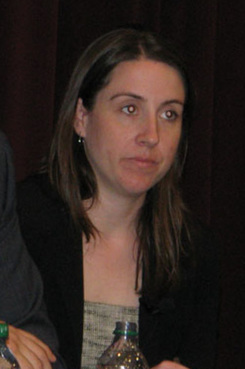U.S. Justice Dept., Under Jeff Sessions, Opens New Front Against the CFPB
The relationship between the U.S. Justice Department and Consumer Financial Protection Bureau, already fraught under the tenure of U.S. Attorney General Jeff Sessions, moved to even shakier territory when the two agencies staked out opposing positions over the rightful successor to Richard Cordray.
November 25, 2017 at 11:41 AM
6 minute read

Updated 7:53 p.m.
The relationship between the U.S. Justice Department and Consumer Financial Protection Bureau, already fraught under the tenure of U.S. Attorney General Jeff Sessions, moved to even shakier territory when the two agencies staked out opposing positions over the rightful successor to Richard Cordray.
The Justice Department's Office of Legal Counsel endorsed the view that, under the Federal Vacancies Reform Act, Trump could appoint any Senate-confirmed official to step in as the CFPB's acting director, senior Trump administration officials said Saturday.
 Leandra English. Credit: Credit Union National Association.
Leandra English. Credit: Credit Union National Association.The administration named Mick Mulvaney, director of the Office of Management and Budget, as the CFPB's interim head on Friday, just hours after CFPB Director Richard Cordray announced he was resigning and named his chief of staff, Leandra English, as deputy director in an apparent effort to stave off a Trump-picked successor.
The Office of Legal Counsel, which confronts legal questions facing executive agencies, informally issued that guidance to the White House. Late Saturday, the Justice Department published the opinion, written by Steven Engel, the assistant attorney general in charge of OLC. Engel joined the Trump administration from Dechert.
The move marked the latest flare-up between the Justice Department and the CFPB, the Obama-era agency long in the crosshairs of financial industry companies and Republican leaders on Capitol Hill. The agency has long fought credit card companies, mortgage lenders and debt collectors, collecting billions in penalties.
The Justice Department in March abandoned its defense of the CFPB's single-director structure. In the aftermath, U.S. attorney offices walked away from CFPB in federal trial court cases in which prosecutors had been serving as local counsel.
The CFPB and the Justice Department appear to be approaching a fresh standoff in federal court over the leadership of the agency. White House officials, however, downplayed the idea there would a lawsuit over who is rightfully serving as acting director.
Asked about English, one White House official said, “We expect her to be there on Monday. She's the deputy director of the CFPB. She should be there on Monday.”
Cordray asserted that under the Dodd-Frank Act, the financial reform statute that created the CFPB, English would serve as acting director until the Senate confirmed any nominee from Trump. Announcing English's new role, Cordray cited “section 1011(b)(5) of the Dodd-Frank Act,” which states that the deputy director “shall … serve as acting director in the absence or unavailability of the director.”
A senior Trump administration official said Saturday that similar language appears in statutes concerning other agencies where the president can appoint an acting director under the Federal Vacancies Reform Act.
The law does not apply to certain independent agencies, but the CFPB does not qualify for such an exception because it is not run by a multimember commission, the administration official said. “To us, this seems like a clear-cut legal question,” the official said. President Trump assailed the bureau in a tweet Saturday:
The Consumer Financial Protection Bureau, or CFPB, has been a total disaster as run by the previous Administrations pick. Financial Institutions have been devastated and unable to properly serve the public. We will bring it back to life!
— Donald J. Trump (@realDonaldTrump) November 25, 2017
The tension has thrust the first significant transition of power at the CFPB into a state of confusion. Indeed, two people appear poised to walk into the CFPB's headquarters, just a block away from the White House, on Monday asserting to be its leader.
“We'll find out how Ms. English decides to act at the appropriate time,” said one White House official. “We think, again, we have gone out of our way to avoid an unnecessary legal battle with Mr. Cordray and his actions clearly indicate he's trying to provoke one.”
A spokesman for the CFPB did not immediately respond to a request for comment Saturday.
Mayer Brown partner Andrew Pincus, who led the legal challenge to uphold restrictions that block consumers from forming class actions to sue banks, said in a blog post Saturday: “There is no serious argument that the Dodd-Frank Act precludes the president from exercising his authority under the Vacancies Act.”
Pincus added: “Hopefully, November 27 will not see dueling acting directors attempting to administer the CFPB.”
The Justice Department's OLC opinion is posted below.
Read more:
Who's Leading the CFPB? Trump Tees Up Clash Over Acting Director
What Lawyers Are Saying About Richard Cordray's CFPB Departure Plans
Consumer Bureau Is Losing a Trial Court Ally in the US Justice Department
Who's Hiring from the CFPB? These Law Firms Showed Interest.
The CFPB, Often a Winner in Court, Hit a Rough Patch This Summer
Two Venable Partners, Including Outspoken Dodd-Frank Critic, Join Trump Team
This content has been archived. It is available through our partners, LexisNexis® and Bloomberg Law.
To view this content, please continue to their sites.
Not a Lexis Subscriber?
Subscribe Now
Not a Bloomberg Law Subscriber?
Subscribe Now
NOT FOR REPRINT
© 2025 ALM Global, LLC, All Rights Reserved. Request academic re-use from www.copyright.com. All other uses, submit a request to [email protected]. For more information visit Asset & Logo Licensing.
You Might Like
View All
FTC Sues PepsiCo for Alleged Price Break to Big-Box Retailer, Incurs Holyoak's Wrath
5 minute read
Supreme Court Will Hear Religious Parents' Bid to Opt Out of LGBTQ-Themed School Books

Wells Fargo and Bank of America Agree to Pay Combined $60 Million to Settle SEC Probe
Trending Stories
- 1South Florida Attorney Charged With Aggravated Battery After Incident in Prime Rib Line
- 2'A Death Sentence for TikTok'?: Litigators and Experts Weigh Impact of Potential Ban on Creators and Data Privacy
- 3Bribery Case Against Former Lt. Gov. Brian Benjamin Is Dropped
- 4‘Extremely Disturbing’: AI Firms Face Class Action by ‘Taskers’ Exposed to Traumatic Content
- 5State Appeals Court Revives BraunHagey Lawsuit Alleging $4.2M Unlawful Wire to China
Who Got The Work
J. Brugh Lower of Gibbons has entered an appearance for industrial equipment supplier Devco Corporation in a pending trademark infringement lawsuit. The suit, accusing the defendant of selling knock-off Graco products, was filed Dec. 18 in New Jersey District Court by Rivkin Radler on behalf of Graco Inc. and Graco Minnesota. The case, assigned to U.S. District Judge Zahid N. Quraishi, is 3:24-cv-11294, Graco Inc. et al v. Devco Corporation.
Who Got The Work
Rebecca Maller-Stein and Kent A. Yalowitz of Arnold & Porter Kaye Scholer have entered their appearances for Hanaco Venture Capital and its executives, Lior Prosor and David Frankel, in a pending securities lawsuit. The action, filed on Dec. 24 in New York Southern District Court by Zell, Aron & Co. on behalf of Goldeneye Advisors, accuses the defendants of negligently and fraudulently managing the plaintiff's $1 million investment. The case, assigned to U.S. District Judge Vernon S. Broderick, is 1:24-cv-09918, Goldeneye Advisors, LLC v. Hanaco Venture Capital, Ltd. et al.
Who Got The Work
Attorneys from A&O Shearman has stepped in as defense counsel for Toronto-Dominion Bank and other defendants in a pending securities class action. The suit, filed Dec. 11 in New York Southern District Court by Bleichmar Fonti & Auld, accuses the defendants of concealing the bank's 'pervasive' deficiencies in regards to its compliance with the Bank Secrecy Act and the quality of its anti-money laundering controls. The case, assigned to U.S. District Judge Arun Subramanian, is 1:24-cv-09445, Gonzalez v. The Toronto-Dominion Bank et al.
Who Got The Work
Crown Castle International, a Pennsylvania company providing shared communications infrastructure, has turned to Luke D. Wolf of Gordon Rees Scully Mansukhani to fend off a pending breach-of-contract lawsuit. The court action, filed Nov. 25 in Michigan Eastern District Court by Hooper Hathaway PC on behalf of The Town Residences LLC, accuses Crown Castle of failing to transfer approximately $30,000 in utility payments from T-Mobile in breach of a roof-top lease and assignment agreement. The case, assigned to U.S. District Judge Susan K. Declercq, is 2:24-cv-13131, The Town Residences LLC v. T-Mobile US, Inc. et al.
Who Got The Work
Wilfred P. Coronato and Daniel M. Schwartz of McCarter & English have stepped in as defense counsel to Electrolux Home Products Inc. in a pending product liability lawsuit. The court action, filed Nov. 26 in New York Eastern District Court by Poulos Lopiccolo PC and Nagel Rice LLP on behalf of David Stern, alleges that the defendant's refrigerators’ drawers and shelving repeatedly break and fall apart within months after purchase. The case, assigned to U.S. District Judge Joan M. Azrack, is 2:24-cv-08204, Stern v. Electrolux Home Products, Inc.
Featured Firms
Law Offices of Gary Martin Hays & Associates, P.C.
(470) 294-1674
Law Offices of Mark E. Salomone
(857) 444-6468
Smith & Hassler
(713) 739-1250











